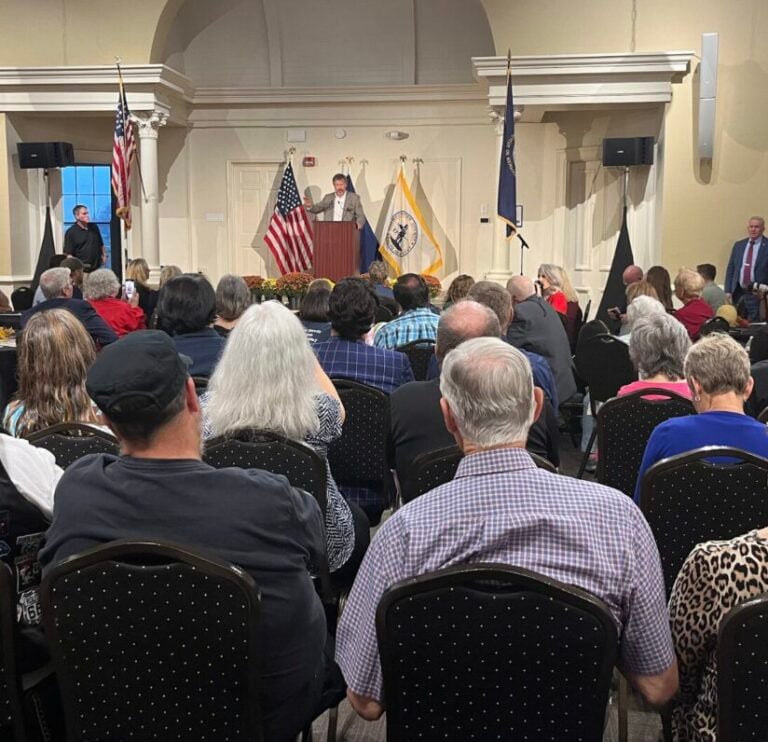By Judy Clabes
NKyTribune editor
In keeping with his campaign promises to “change Frankfort,” Kentucky Governor Matt Bevin has moved quickly in his first few months in office to restructure several state boards and commissions, among them the Kentucky Racing Commission, the Kentucky Horse Park Commission and the Kentucky Workers Compensation Nominating Commission.
He has even put a hold on the naming of new Kentucky Colonels, saying he wants to review the criteria for awarding the state’s highest honorary recognition.

Each restructuring has created some level of controversy, but perhaps none so much as the Governor’s executive order abolishing the Workers Compensation Nominating Commission and re-creating it with new members and new criteria.
This has landed in Franklin Circuit Court in the form of a lawsuit challenging the Governor’s actions. It was filed by two labor unions, a former member of the Commission, and three individuals who say they are injured workers.
Franklin Circuit Court Judge Phillip Shepherd has not yet ruled on the lawsuit — instead urging the opposing parties to try to resolve their differences. He expressed concern about the time involved in working the case through the system and the delays that could ensue regarding workers’ compensation claims.
He did order the nominating commission not to make any recommendations to the governor until after the lawsuit is resolved.
The nominating commission is charged with recommending the judges who decide if and how much employers must pay workers hurt on the job. The governor has the authority to appoint the judges, but must appoint only a judge recommended by the commission.
Public documents obtained by the NKyTribune shed some light on the issues that led to Gov. Bevin’s decision to reorganize the commission — and perhaps provide some insight on how he intends to follow through on a consistent thread in his campaign: “Changing Frankfort . . .giving Kentucky a fresh start.”
The documents reveal concern about “pay-to-play politics” (campaign contributions translating to appointments), about unlimited terms that created “entrenched” positions for individuals and law firms, and about the commission’s lack of collaboration — as required by statute — with the Chief Administrative Law Judge and the chair of the Workers’ Compensation Board.
Summaries of the affidavits are included below, along with links to the documents in their entirety.
Chief of Staff for the Labor Cabinet J. Brooken Smith’s sworn affidavit reveals concerns about “entrenched” members and law firms and lack of adherence to procedures clearly spelled out in the regulations. His statement shows how the administration’s particular changes in the commission came about.
Veteran of several administrations as Deputy General Council in the Office of the Governor, Michael Alexander points out in his sworn affidavit that restructuring of statutory agencies is nothing new. Critics of the administration have argued that Bevin’s reorganization of the commission is an unprecedented use of executive power. Alexander points out that four prior governors have used the same power 357 times: Brereton Jones, 58; Paul Patton, 121; Ernie Fletcher, 75; and Steve Beshear, 103.

Chief Administrative Law Judge Robert Swisher describes how he has reshuffled case loads in the face of vacancies and says that — despite regulatory requirements — he was only recently consulted about vacancies.
These public records — three affidavits in particular — provide some insight into the issues that drove the Governor’s actions.
J. Brooken Smith is the chief of staff for the Kentucky Labor Cabinet, hired by Labor Cabinet Secretary Derrick K. Ramsey. He says he advises the Secretary on public policy and personnel, including advice to nearly 20 boards, commissions or councils attached to the Cabinet.
In reviewing the work and mission of the Workers’ Compensation Nominating Commission, he said he found “party politics inextricably intertwined” with the Commission’s membership — including political donations. He cites examples of large contributions to Democratic candidates by members of the commission.
He also discovered that multiple members “had become entrenched” over many years; one had served more than 20 years and another for at least a decade without a break in service and that two others were serving at least a third term.
He says he learned that one member was advertising his reappointment to the commission on his website while simultaneously promoting his success in the area of workers’ compensation
“Though not expressly stated,” Smith says in his affidavit, “this advertisement gave the impression that the member was somehow equating his membership on the Commission to his success in legal practice.”
He goes on to describe subsequent meetings with the chair of the Commission, Grover Arnett, and administration officials. He says that Arnett offered to “carry” the administration’s “water” on appointments of ALJs, which is not what the commission is charged to do.
Smith also describes an April meeting of the Commission to decide whether to recommend retention of four ALJs whose terms expire July 14. He says that without any detailed, in-depth discussion about the work performance of any of the ALJs up for reappointment or consultation with the Chief Administrative Law Judge Robert L. Swisher (as required by law), the commission recommended reappointment of all four. Gov. Bevin subsequently rejected three of them.
He says that “Governor Bevin called for an end to the ‘pay-to-play’ method of governing” in Kentucky and signaled the “need for a shift in the culture and the way business is done in Frankfort.”
“Given the information found in my review, coupled with Governor Bevin’s public statements,” Smith says, “I, along with the Cabinet’s General Counsel, recommended to the Secretary that he recommend to Governor Bevin the replacement of the Commission’s members.”
Further discussions, he says, resulted in a recommendation that the Commission be completely revamped and “that the reorganization process permanently reduce the impact of party politics” on the Commission.
That led to Bevin’s Executive Order (which is being challenged by the lawsuit) abolishing the old Commission and establishing a new one consisting of seven members appointed by the Governor — one from the state at-large, two attorneys experienced in workers’ compensation (one who customarily represents claimants and one who customarily represents employers), and two each from the two political parties having the largest and second largest number of registered voters. It also created four staggered classes and creates a two-term limit. It reaffirms the Commission’s obligation to consult with the Chief Administrative Law Judge, the Chairman of the Workers’ Compensation Board, and the Commissioner on appointments.
Michael T. Alexander affidavit
Michael T. Alexander is Deputy General Council in the Office of the Governor, a position he has held for about 23 years. His affidavit addresses the precedents for Governor’s Executive Orders to reorganize and/or recreate statutory agencies.
He says that his review of records of the last four Governors shows a total of 357 Executive Reorganization Orders, including 34 orders that abolished and/or recreated agencies and involving changes to statutory memberships. These included such reorganizations as the Kentucky State Fair Board, the Kentucky Horse Racing Commission, the Kentucky Mining Board, the Justice and Public Safety Cabinet, and the State Board of Agriculture.
He further says that several orders abolished and/or recreated Executive Cabinets and reorganized the whole Executive Branch of Government.
Swisher is chief administrative law judge for the Kentucky Department of Workers’ Claims (DWC), a position he has held since 2014; he was appointed by Gov. Steve Beshear to the commission in 2010. He is responsible for managing and supervising the other administration law judges, making assignments of cases and setting sites for the hearings.
He says that in April, the Senate confirmed five of the recommended Administrative Law Judges, but did not confirmed three others which created immediate vacancies and necessitated reassignment of their cases to the remaining 14 judges.
“On the average,” he says in the affidavit, “this meant each of the remaining 14 ALJs were assigned four additional opinions, many of which were due within a few weeks of the week of Monday, April 18.”
Swisher describes other efforts made to assure that there were no long-term delays or “lost” claims. He also reassigned parts of the May and June dockets — including taking on regular docket assignments himself on top of his administrative duties.
He also says he notified the Kentucky Workers’ Association and a list of defense attorneys and asked them to spread the word about the problem related to vacant seats — and to alert him to any particular problems needing “immediate attention.”
He also started discussions about four other ALJs whose terms were set to expire on July 14. The nominating commission recommended all four for re-appointment but Gov. Bevin rejected three, reappointing only Jane Rice Williams. This meant the reassignment of the dockets of the other three for June and July and making other adjustments to schedules.
“The Petitioners in the litigation filed against Governor Bevin related to the Workers’ Compensation Nominating Commission have alleged that an “unprecedented” six ALJs have been removed this year. That is not accurate. As of the date of this Affidavit (May 31), there are only three vacancies in the ALJ ranks; the terms of the three non-reappointed ALJs do not expire until July 14, 2016, and I expect those ALJs will work diligently to write and issue opinions right up to the date their terms expire.”
But he says, “The current reshuffling of work, however, is not sustainable in the long-term.”
Swisher also points out that on May 9, Governor Bevin issued an Executive Order reorganizing the nominating commission that included the appointment of seven new individuals. He said he was asked to participate in discussions in two meetings held by the commission since the reorganization and that he can’t recall another time he has been asked to participate in such discussions.


















“Pay to Play” seems to be well established in state government and I agree it needs to go. The Governor may very well have the power to do what he has done in this case and previous commission rearrangements, but the bottom line is I DON’T TRUST THIS MAN! His actions regarding the Horse Park Commission was particularly hateful and vindictive. It appears that Damon Thayer got to him on that one. He and Trump share the “I don’t want anybody to see my taxes” approach regardless of previous statements made by them. That alone is a reason to not trust either.